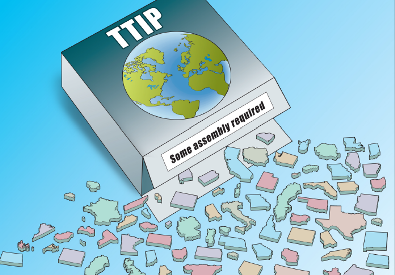US trade officials try to curb Europe’s expectations

New York Times | September 12, 2013
US trade officials try to curb Europe’s expectations
By DANNY HAKIM
LONDON — American trade officials said in interviews this week that trans-Atlantic trade talks should not be seen as a panacea for Europe’s economic ills, and they continue to resist the idea of including financial service regulations in the discussions.
Michael B. Froman, the United States trade representative, said Thursday that the trade talks “can be a very important element of Europe’s effort to get back on a path toward growth, but it’s got to be only one piece of an overall growth strategy.”
The sprawling trade negotiations, which began in July, are known as the Transatlantic Trade and Investment Partnership, or TTIP (pronounced TEE-tip).
“If TTIP is seen as a way for Europe to export its way out of its problems, it won’t have support,’’ Mr. Froman said from Washington in a phone interview. “It’s got to be part of an overall effort to promote reform and get their economies moving again.”
The European Union has raised financial services regulation as a possible subject for these negotiations. But American trade negotiators continue to stress that such regulation should be addressed elsewhere and not encompassed in the negotiations. After the passage of the Dodd-Frank act in 2010 to reform the American financial system, there appears to be limited appetite among regulators there to reopen the issue in the trade talks.
“Our view is that there is nothing that we should do, or are going to do through TTIP, that would weaken Dodd-Frank,” Mr. Froman said. “We think it’s important that the work already under way in bilateral mechanisms, as well as forums like the Financial Stability Board, continue to make progress in parallel alongside the trade negotiations.” The Financial Stability Board, based in Switzerland, is an international association that includes central banks and finance ministries.
American officials cautioned, however, that it was too soon to say much had definitely fallen off the table.
The European Commission’s mandate, for instance, excludes audio visual and cultural services, driven by French concerns about protecting their film industry. But the chief American negotiator, L. Daniel Mullaney, said, “We wouldn’t conclude those issues are excluded from the negotiations.”
“For us and probably for the Europeans, the issue in a comprehensive negotiation like this is, Where can a comprehensive negotiation add value to the relationship?” Mr. Mullaney said in an interview last week. “The discussions that we are having are going to focus on those issues.”
The talks have been complicated by the revelation of American spying stemming from the leaks by Edward J. Snowden, the former National Security Agency contractor, which has sharply recast the European view of issues like data privacy addressed in the talks. Asked about the spying scandal, Mr. Mullaney said, “Our negotiations during the first round were, I’d say, substantive and workmanlike.” He added that “the discussions on some of the intelligence issues were addressed in another forum, so they didn’t play a big role.”
He suggested that it was too early to set any deadline for concluding the talks.
“The United States and Europe have been working together for a long time to try to remove trade and investment barriers, so any low-hanging fruit has long ago been eaten and digested,” he said. “We’re left with many of the challenging issues.”





